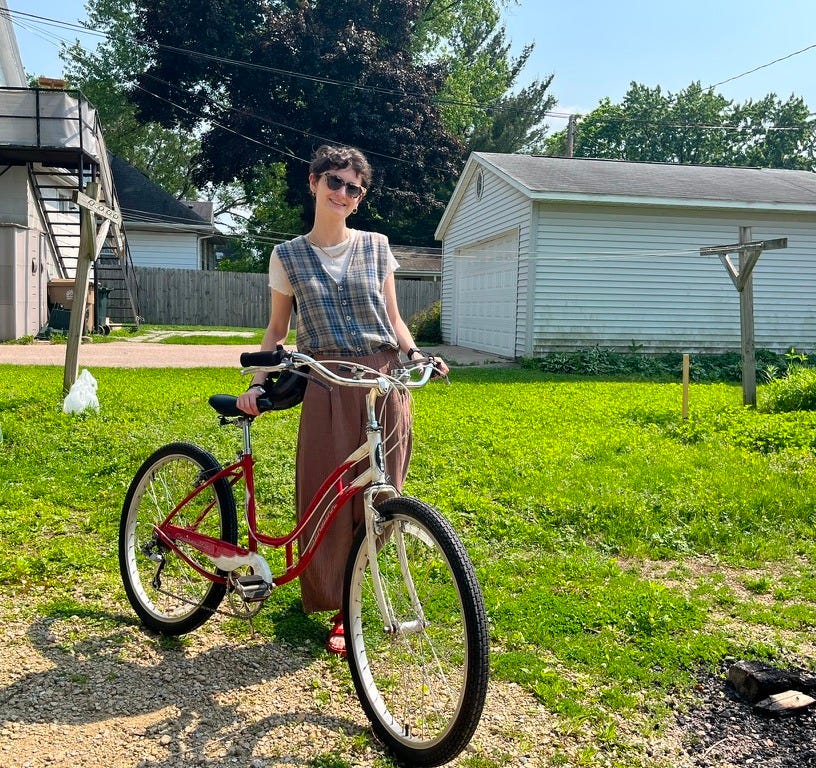There’s an oxymoronic cycle when it comes to trusting the body while living with chronic illness.
It goes like this: the more our bodies harm us through debilitating flares, depleting crashes, and new, problematic symptoms, the more we learn to be wary, to mistrust that our bodies will support us and our needs.
In response, we understandably disconnect from the body. But the more we disconnect, the harder it becomes to interpret and respond to our body’s cues—leading to more flares, crashes, and symptoms that feel like betrayal.

The cycle continues until we take action to break it. But breaking the Cycle of Body Mistrust is really, really difficult. I’ve been there.
Awareness is often the first step in any healing process. So I’ll present to you today 5 ways body mistrust might be showing up in your life, not to pathologize you or convince you there’s another thing wrong with you, but in an effort to spark some gentle, and compassionate awareness.
As you read through the list, notice if any self-judgment creeps in. If it does, pause. Remind yourself: your body and mind have been doing their best to protect you. If you recognize yourself in any of these experiences, know that it’s completely understandable and nothing to be ashamed of. You can also find some supportive reminders related to body mistrust on my instagram post here.
5 ways mistrusting your body shows up in your life
You struggle to know when a symptom requires action or just acceptance. Body mistrust can make it difficult to discern whether a symptom requires immediate medical attention and a prompt trip to the nearest ER, or whether it’s something direly unpleasant but will pass with time. You might find yourself stuck in the loop of “I can probably ignore this symptom… wait, can I?”—a cycle of second-guessing and spiraling worry that’s only heightened when you don’t trust your body’s signals. Body trust, by contrast, sounds like: “I know my body, and I know better than anyone else when I need to take action.”
You feel like you’re never doing enough to get better. Body mistrust convinces you that if you're not improving, it must be your fault. This might look like obsessing over the “perfect” treatment plan, beating yourself up for missing a medication dose, or feeling like a failure when you need to cancel an appointment. The trust with your body isn’t there, likely because it’s felt like your body has betrayed you, over and over again. So instead of blaming the illness, you blame yourself. You wonder, “Am I really doing enough to get better? I don’t think I am.” Body trust, instead, would say: “I am trying my best, and that is all I can do.”
You spiral into fear about your future. Body mistrust often fuels anxious thought spirals about what lies ahead, especially when your symptoms feel unpredictable. Your mind may latch onto worst-case scenarios, magnifying symptoms and their potential consequences in an attempt to regain some semblance of control. This is a powerful coping strategy, because it convinces us that there is less uncertainty (we’re certain everything will go wrong!). But in the long run, these thought patterns can heighten anxiety, hopelessness, and fear about the future. You might find yourself thinking, “I don’t know what to do to feel better… I don’t think I ever will.” Body trust would gently say: “I will meet the future when it comes. Right now, I will take care of my body as it is, in this moment.”
You avoid opportunities—just in case. Body mistrust can stop you from saying yes to things you want to do. When you don’t trust your body, you fear any activity that could possibly ignite a flare. Over time, this fear can shrink your world. Your tolerance for risk narrows, and uncertainty feels unbearable. You might catch yourself thinking, “I can’t make any plans… what if I feel awful? There are too many variables to consider.” Body trust would respond: “If I flare, I trust myself to figure out what’s next.”
You overanalyze every physical sensation. When you don’t trust your body, it can create a constant state of hypervigilance, leaving you on edge analyzing every sensation and symptom, unable to relax into your body. You might think, “I never know how to manage my pain and illness symptoms. I’m doing everything wrong.” The default becomes constant monitoring, instead of self-compassion. Body trust would gently remind you: “Not every sensation is a cause for alarm. My body is allowed to change and evolve.”
supporting body trust
My journey to body trust has been long, and it’s still ongoing. But I’ve reached a place where I confidently know when I need to go to the ER, and when I don’t, where I allow myself to take “risks” with my activities (see below: me riding a bike last week for the first time post severe illness!), and where I can halt thought spirals before they debilitate me.
In my work with my clients, I often see the same tension: a deep longing to trust the body again, alongside a fear that letting go of hypervigilance means letting go of safety. If they stop monitoring every symptom or stop taking full responsibility for every flare, they fear they won’t be prepared when something bad happens. This fear makes sense, it’s the body acting as a protector. But the truth is, in life, bad things sometimes happen… our job is to meet those challenges with grace and acceptance.
Body trust isn’t something you force—it grows in the small moments you choose to meet yourself with care, including seeking support when needed.
Choose yourself and your body, illness included, today.
Sending lots of love for joy and healing always <3,
Dr. Talia
Reflection for you: How does the Cycle of Body Mistrust show up in your life? Which of these reasons feel especially relevant to your life? Which reminder can you implement in your day-to-day life? I’d love to know in the comments.
“Thinking, Chronically” is a reader-supported publication—I write these resources and reflections for free because I am passionate about supporting the emotional needs of the chronic illness community! Consider liking, sharing with a friend, and upgrading to a paid subscription to support my work. Read more here.
Submit a question here for Ask Dr. Talia. This segments gives subscribers the opportunity to submit questions about managing the emotional impact of chronic illness. Questions about experiences that your friends, family, and even therapist may not understand.
Want to work with me 1-on-1?
I specialize in supporting you to live in harmony with your body, embrace and accept your authentic self illness included, access daily joy, and cultivate deep self-trust.
send questions to drtaliaphd@gmail.com.
book a 15-min consult call here.
Want to find me other places and support my work?
on instagram; meditate with me on aura health
Some previous posts you may enjoy:
10 ways to measure chronic illness progress beyond symptom improvement; 5 ways internalized ableism silently erodes self-acceptance; the hard truths we must accept to embrace pacing for chronic illness








Thank you so much for this excellent, encouraging writing. It really touched me today, as I sit here having to surrender to my body during this flare, instead of all the things I WANT to do. I shared it with my wife, who is slowly building her gentleness, care, and trust of her own body as she claims her grief and anger about the constant, lifelong gaslighting by family and medical professionals. A horrendous pain in the ass and infuriating but at least she's no longer participating and reinforcing it. 😢
I feel like there are also a lot of explicit and implicit messages from society to chronically ill people that further point 2: you’re not doing xyz (even things you can’t do or would be actively harmful for your particular condition) therefore it’s your fault, presenting chronic illness as a moral failing. For me, body mistrust shows up a lot when I’m about to do something out of my comfort zone or go to a place where I had a bad flare up before. Trying to be patient, listen to what my body says, but also know when I need a gentle push is a tough balance!